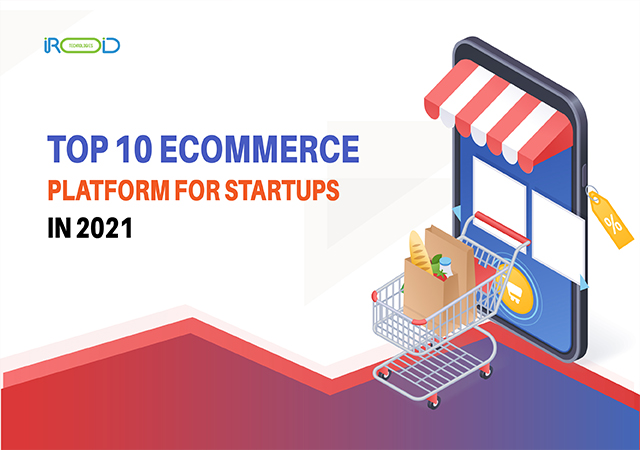Top 10 ecommerce platforms for startups

The online retail business is a deeply contentious space, and that involves the ecommerce platforms that power them. According to a recent study, there are over 370 eCommerce platforms convenient for businesses. A particular person can’t swim through hundreds of opportunities to find the finished solution, so we’ve taken it upon personally to evaluate the ten most prevalent ecommerce platforms and do a side-by-side contrast of each, so you can choose based on your personal requirements.
Shopify
Started in 2004 by a collection of snowboarding fanatics, Shopify is now the chief ecommerce solution in the market with more than 1 million businesses beyond 175 countries. Shopify’s retailers include a gamut of areas and industries. Shopify is one of the most immeasurable ecommerce platforms for newcomers and small to medium size businesses that demand their hands held when establishing up their store. Everything you want is now integrated into the platform: from storefront picture to content marketing to review analytics. Once you have the fundamentals set up, it’s a mere matter to upgrade your store with third-party additions–or even replace the shop’s code itself.
Shopify Plus
Shopify Plus is an updated version of the first Shopify platform that is targeted towards enterprise-level companies. In addition to the eCommerce platform itself, Shopify Plus allows supplementary assistance and advantages more adapted to large, multinational companies. Shopify Plus is one of the most dependable ecommerce platforms for enterprise companies, gratitude to its capacity to explain compound technology while still providing it to handle product entrants of up to 100 variants beyond multiple channels. Shopify Plus offers more prominent levels of technical and onboarding help, as well as automation tools to assist brands function at the range.
BigCommerce
BigCommerce was established in 2009. The men behind it are two Australians, Eddie Machaalani and Mitchell Harper. It’s now headquartered in Austin, Texas with 750+ employees disseminated across departments all over the globe. As a front open SaaS solution, BigCommerce presents merchants with advanced enterprise-grade functionality, customization, and performance with uniformity and ease-of-use. BigCommerce is most becoming for SMBs & MM who demand a lot from their ecommerce platform with large or complicated catalogs. BigCommerce combines a lot of characteristics out of the box and like other platforms allows for the platform to be reached with third-party applications. BigCommerce also helps both B2C and B2B businesses on the corresponding platform.
Magento
Magento is one of the most widespread open-source ecommerce platforms in the system. It was formerly issued in 2009 and then succeeded by Magento 2.0 in 2015 with an advanced code base and more usability/assurance hallmarks. Magento was then acquired by Adobe in 2018 and now survives in two versions, namely Magento Open Source and Magento Commerce. Magento is most suited for small-to-medium businesses that have previously confirmed demand, as well as the time, workers, and experience to build their own site. The platform is very important and has a library of above 5,000 extensions, but needs a more extended development time and a more substantial budget than most of its rivals.
WooCommerce
WooCommerce is a free and open-source WordPress shopping cart plugin. It is owned and produced by WordPress. It is one of the most successful eCommerce choices on the market and appears on 30% of all stores on the internet. WooCommerce is the most desirable ecommerce platform for small businesses that previously have a site on WordPress, or who work on fixed funds but still want a sturdy online store. It has thousands of third-party issues and plugins, giving it an exceptional deal of adaptability to adjust to most demands.
Squarespace
Squarespace is a New York-based SAAS company that presents website and ecommerce store building and entertaining to clients. Customers use drag-and-drop functionality and pre-built website templates here to produce their web pages. Squarespace is most suitable for entrepreneurs and small business proprietors with essential e commerce needs. The ecommerce platform is useful, but only as a guide to the main website developer. Businesses with more high-level online retail conditions or who manage a large amount of record would be better off by a more dedicated platform.
Wix
Wix is a cloud-based website developer that permits users to create online storehouses through drag-and-drop tools. It has an expanded array of templates and ideas that make it simple for newcomers and resource-strapped business proprietors to build a compelling and practical website. Wix.com is the most suitable ecommerce platform for small companies that don’t have admittance to a dedicated web designer. The site builder itself is straightforward to use and the ecommerce functionality is strong enough to satisfy fundamental needs. Plugins can help increase functionality.
Big Cartel
Big Cartel is an ecommerce platform by professionals, for professionals. Started in 2005, this SaaS site builder concentrates on producers who need a home to sell artwork, clothes, ornaments, and photo prints. Big Cartel is the most suited ecommerce platform for artists and entrepreneurs who are looking for an alternative option to Etsy. They are a platform that understands the artist's needs. The builder itself is manageable and uncomplicated and encourages artists to put their most salutary foot forward.
Volusion
It was first created in 1999. Volusion is one of the longest-lasting ecommerce platforms. It persists successfully and constant despite the introduction of modern opponents like Shopify and Wix, with over 30,000 stores using the system and having produced over $28 billion in sales. Volusion is the most suitable ecommerce platform for startups and small businesses who want to get ignited quickly but still have the opportunity to grow within their preferred solution.
In conclusion
At the end of the day, there is no particular overall “most beneficial” ecommerce platform. Every business has its own succession of needs, budget, and labor that prescribes which online retail application works most useful for them. Consider your needs closely and don’t be scared to run a few trials to see which explication you like most satisfying. Do your due persistence and don’t cut edges, and you will have an application that will boost your business to new mountains. For more assistance contact iROID Technologies.Therefor we are the best Custom Ecommerce development company in India.
FAQ:
What is the best programming language for an e-commerce website?
The greatest programming language for creating e-commerce applications is JavaScript. Expert developers claim that it gives the application dynamic capability and versatility.
JavaScript is now the most often used scripting language for eCommerce websites as a result.
Can I turn my website into an online store?
Any website can be turned into an eCommerce app, thus yes. However, you might need to go through additional procedures if you wish to convert your website into an e-commerce application. To do that, you can also use specialists in eCommerce app development.
Where can I find the best solution for my E-commerce?
If you are a non-developer or a beginner, you may need to hire experts to develop a perfect e-commerce app. We are one of the top mobile app development companies in India where you can develop e-commerce apps. You can take their help to build an eCommerce platform for your startup business.
Can I turn my website into an online store?
Yes, any website can be turned into an eCommerce app. However, if you want to convert your existing site into a fully functional mobile eCommerce application, you may need to follow additional development steps such as integrating payment gateways, setting up product databases, and ensuring secure user authentication. If you want to build apps like Zepto, working with experienced eCommerce app developers can help you create a seamless, scalable, and high-performance online store.

